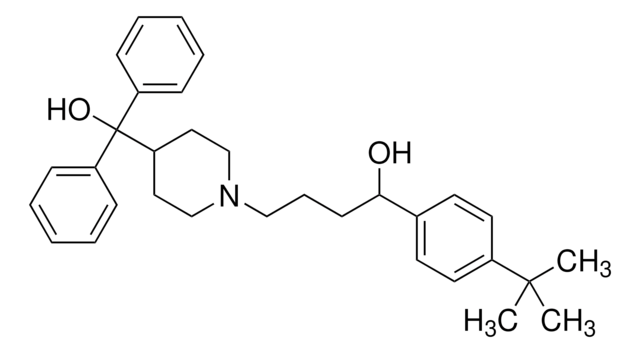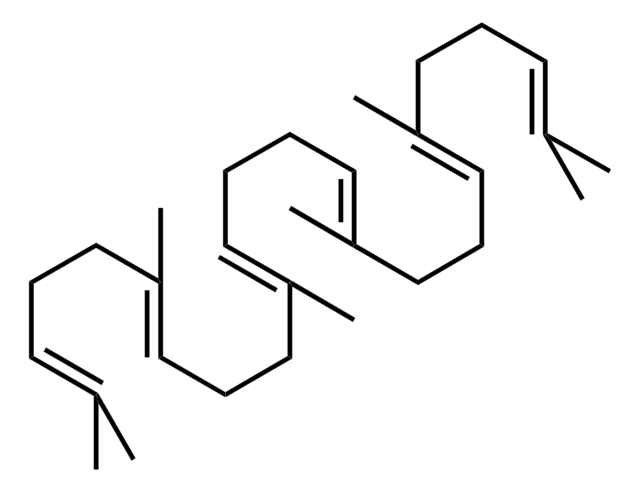C1758
Kokosnussöl aus Cocos nucifera
low-melting solid
Synonym(e):
Copraöl, Kokosfett
Anmeldenzur Ansicht organisationsspezifischer und vertraglich vereinbarter Preise
Alle Fotos(2)
About This Item
Empfohlene Produkte
Biologische Quelle
Cocos nucifera
Qualitätsniveau
Form
low-melting solid
mp (Schmelzpunkt)
23-27 °C
Lipid-Typ
oils
Versandbedingung
ambient
Lagertemp.
room temp
Suchen Sie nach ähnlichen Produkten? Aufrufen Leitfaden zum Produktvergleich
Anwendung
- Linseed, Baru, and Coconut Oils: NMR-Based Metabolomics, Leukocyte Infiltration Potential In Vivo, and Their Oil Characterization. Are There Still Controversies: This research utilizes NMR-based metabolomics to explore the biochemical properties of various oils, including coconut oil, and investigates their potential for leukocyte infiltration in vivo. The findings contribute to understanding the health implications and biochemical interactions of coconut oil (Figueiredo et al., 2022).
Physikalische Form
Usually a solid at room temperature
Lagerklassenschlüssel
11 - Combustible Solids
WGK
WGK 1
Flammpunkt (°F)
>235.4 °F - closed cup
Flammpunkt (°C)
> 113 °C - closed cup
Persönliche Schutzausrüstung
Eyeshields, Gloves, type N95 (US)
Hier finden Sie alle aktuellen Versionen:
Besitzen Sie dieses Produkt bereits?
In der Dokumentenbibliothek finden Sie die Dokumentation zu den Produkten, die Sie kürzlich erworben haben.
Kunden haben sich ebenfalls angesehen
Young Taek Oh et al.
Physiology & behavior, 167, 194-201 (2016-10-25)
Previous rodent studies showed that when injected into the brain, free fatty acids (FFAs) reduced food intake in an oleate-specific manner. The present study was performed to test whether food intake is regulated by circulating FFAs in an oleate-specific manner.
Jingcan Sun et al.
Food chemistry, 141(3), 2828-2832 (2013-07-23)
Ester synthesis was carried out in a solvent-free system of lipase, coconut oil and ethanol or fusel alcohols to ascertain the reaction mechanism. During ester formation, octanoic and decanoic acids increased initially and then decreased gradually, indicating that ester production
Xuezhi Ding et al.
Tropical animal health and production, 44(7), 1541-1545 (2012-03-01)
The objective was to evaluate the effect of dietary coconut oil on methane (CH(4)) emissions and the microbial community in Tibetan sheep. Twelve animals were assigned to receive either a control diet (oaten hay) or a mixture diet containing concentrate
C Reveneau et al.
Journal of dairy science, 95(4), 2061-2069 (2012-03-31)
Feeding animal-vegetable (AV) fat or medium-chain fatty acids (FA) to dairy cows can decrease ruminal protozoal counts. However, combining moderate to large amounts of AV fat with monensin (tradename: Rumensin, R) could increase the risk for milk fat depression (MFD)
M Hollmann et al.
Journal of dairy science, 95(5), 2602-2615 (2012-05-01)
To determine if dietary medium-chain fatty acids (FA; C(8) to C(14)) may mitigate enteric methane emissions, 24 cows were blocked by body size (n=2) and randomly assigned to 1 sequence of dietary treatments. Diets were fed for 35 d each
Unser Team von Wissenschaftlern verfügt über Erfahrung in allen Forschungsbereichen einschließlich Life Science, Materialwissenschaften, chemischer Synthese, Chromatographie, Analytik und vielen mehr..
Setzen Sie sich mit dem technischen Dienst in Verbindung.








